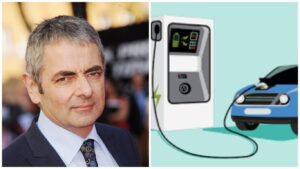Physical Address
23,24,25 & 26, 2nd Floor, Software Technology Park India, Opp: Garware Stadium,MIDC, Chikalthana, Aurangabad, Maharashtra – 431001 India
Physical Address
23,24,25 & 26, 2nd Floor, Software Technology Park India, Opp: Garware Stadium,MIDC, Chikalthana, Aurangabad, Maharashtra – 431001 India

Electric vehicles (EVs) are considered a suitable transportation method apart from cars which have engines using fossil fuel ((Internal Combustion Engine vehicle – ICE). EVs are eco-friendly and a sustainable solution for many issues in the developing world. In almost every country, promoting EVs is happening every day.
Even in such a situation that talks more about Evs’ benefits, a celebrity has commented on his opinion on them. That was Rowan Atkinson, the world-famous actor as Mr Bean. Here is the article on his statement.

Rowan Atkinson has a bachelor’s degree in Electrical and Electronic Engineering from Newcastle University and a Master’s of Science in Electrical Engineering from The Queen’s College. Oxford. So, his opinion had more concessions among the people than a word from an actor. Environmentalists said that it wasn’t pleasant that Rowan Atkinson seemed like promoting fossil fuel vehicles (ICEs) among the people.
So, the Climate Fact Checks team decided to fact-check his opinion.
What are the Matters with Electric Vehicles?
Typically EVs are considered the best eco-friendly transportation method due to their environmental and health benefits. A fully electric mode car produces no carbon and greenhouse gas emissions, lower smog into the atmosphere and less noise. So, they cause cleaner air and healthy people by protecting them from many respiratory illnesses. Also, it is friendly to the country’s economy by saving money for fossil fuels. More details about the advantages of the usage of EVs can be read here.
Rowan Atkinson confirmed that he started using a hybrid vehicle 18 years ago and then changed it to an electric one nine years ago though their electric charging infrastructure could have been better. He said he initially loved electric vehicles with their “fast, quiet and until recently, very cheap to run.” But then he started to feel like he was duped by electric cars, and by now, it doesn’t seem like the best solution for environmental issues.
According to Rowan Atkinson, producing an electric vehicle releases more greenhouse gas emissions than producing an ICE. He stated that it is 70% higher GHG emissions than manufacturing ICE. Also, he talked disappointedly about the lithium-ion battery in the EV. He proposed to have a hydrogen battery instead of the lithium-ion battery in them.
Is the Eco-Friendliness of Electric Vehicles Not True?
Electric vehicles have zero emissions compared to ICEs while driving them on the roads. It was confirmed with tests and also proved by using them. Usually, 1.4 billion tons of GHGs are collected into the atmosphere each year. Most of these GHGs are carbon dioxide. Around 30% of GHGs are contributed by ICEs. Here for more about vehicle emissions.
The source of energy in electric vehicles is electricity. Electricity is produced energy; energy sources can be non-renewable sources like fossil fuel (like coal) or renewable ones. So, there is some emission indirectly while driving an EV as well.
When the electricity for charging the vehicle is taken through a non-renewable energy source, electric cars emit 50% less carbon dioxide than ICE emits. This value increases up to 70% if the energy source is renewable. So, still, EVs seem eco-friendlier than others.
The production process of electric vehicles is much different than ICEs. In the production process, GHGs are released into the atmosphere. The highest emission of GHGs in the electric car manufacturing process occurs in its battery production. Lithium-ion batteries are used in electric cars, and there is a vast amount of GHGs emissions from mining for lithium. Here for the environmental impact of lithium-ion battery manufacturing. And also, the production of the rest parts of the car emits GHGs as well. But this emission is mutual for both EVs and ICEs. Anyway, in the car manufacturing process, the emission of EVs is higher than ICEs.

When the emissions from both vehicle production and driving period are considered, the emission level can be regarded as lower in electric vehicles.

So, even with the emissions in the manufacturing process and the electricity energy producing emissions, the EV still wins over ICE with less emission of GHGs.
So, Rowan Atkinson’s doubt over that is confirmed as a myth and misinformation.
Also, the maintenance cost of these EVs is less, and it is more affordable for the user to maintain the vehicle properly. So, unlike the higher GHG emissions when the care of the car is delayed is not happening practically in EVs.
Sri Lankan Situation of Vehicle Emission and Electric Vehicles
Sri Lanka is also now adapting to the zero-carbon concept and trying to minimise GHG emissions as much as possible through burning fossil fuels. So, EVs can now be found in Sri Lanka. Vega car was produced in Sri Lanka as the first electric supercar in Sri Lanka and South Asia. But Vega can not be seen in Sri Lanka due to different reasons. Instead of that, other regular electric cars are in Sri Lanka. Also, recently it was introduced to Sri Lanka as well.
Anyway, still in Sri Lanka, the trend of EVs needs to be better promoted like in the other countries. There are a few reasons for that. Coal and petroleum burning produce about 50% of Sri Lanka’s energy. Hydropower and new renewable energy sources are used only for 9% and 3% of electricity production. With the current circumstances, electricity is not easy to use for Sri Lankans. There are not many charging points for electric vehicles in Sri Lanka. Also, most of the EVs brought to Sri Lanka were not successful as in the other countries with the climate and infrastructures in Sri Lanka.
Sri Lanka is vulnerable to climate change, so that EVs will be a good solution. But it has yet to be adopted by the Sri Lankans. Also, other important facts like charging points and more energy through renewable energy sources should be encouraged.
Zero-Carbon Emission
The electric vehicle plans are making them zero-emission during their driving period. For that, the energy source must be developed further. Also, there is research for more sustainable alternatives for lithium-ion batteries. Aluminium, iron, silicon, salt and many other options are there, and scientists are trying to make a more effective and eco-friendly battery.
When one day they become successful with their research, EVs will be more environmentally friendly, and there will be no doubt about their emission level compared to ICEs.
If you have any queries or come across suspicious content related to climate change or the environment and want us to verify them for you, then send them to us on our WhatsApp hotline: +917045366366
-With inputs from Mihiri Saparamadhu–